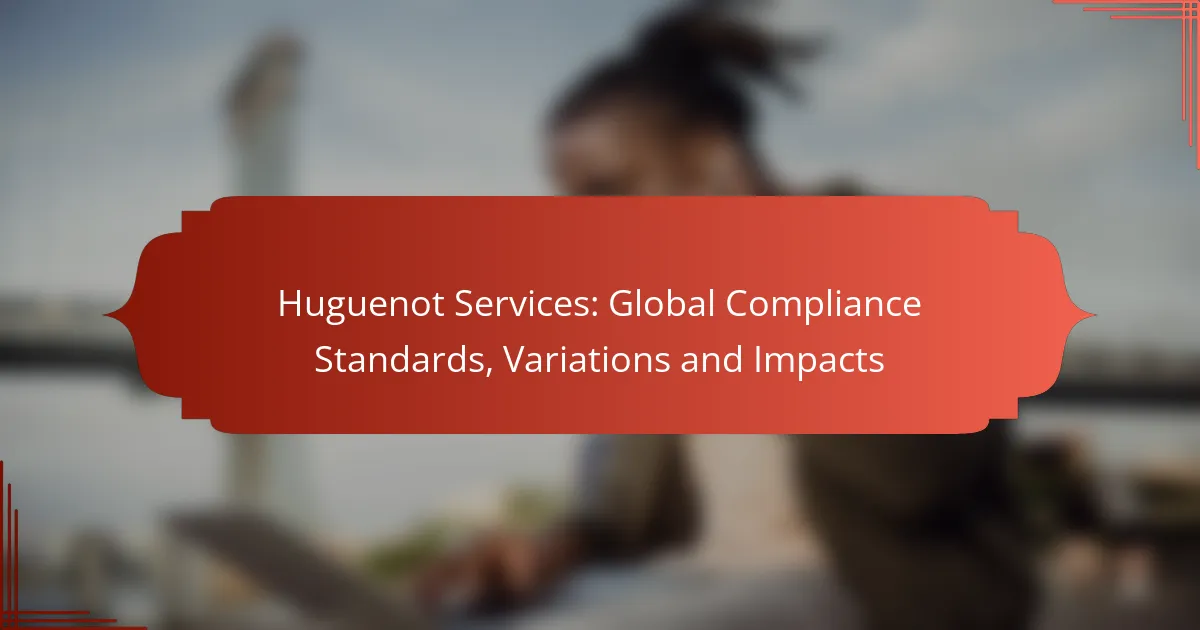Global compliance standards for Huguenot services play a vital role in ensuring that organizations adhere to quality, security, and regulatory requirements, fostering trust and consistency across diverse regions. However, variations in these standards, influenced by local regulatory frameworks and cultural practices, can significantly impact the implementation and effectiveness of Huguenot services. Understanding these differences is essential for organizations aiming to navigate the complexities of global compliance and enhance their operational efficiency.
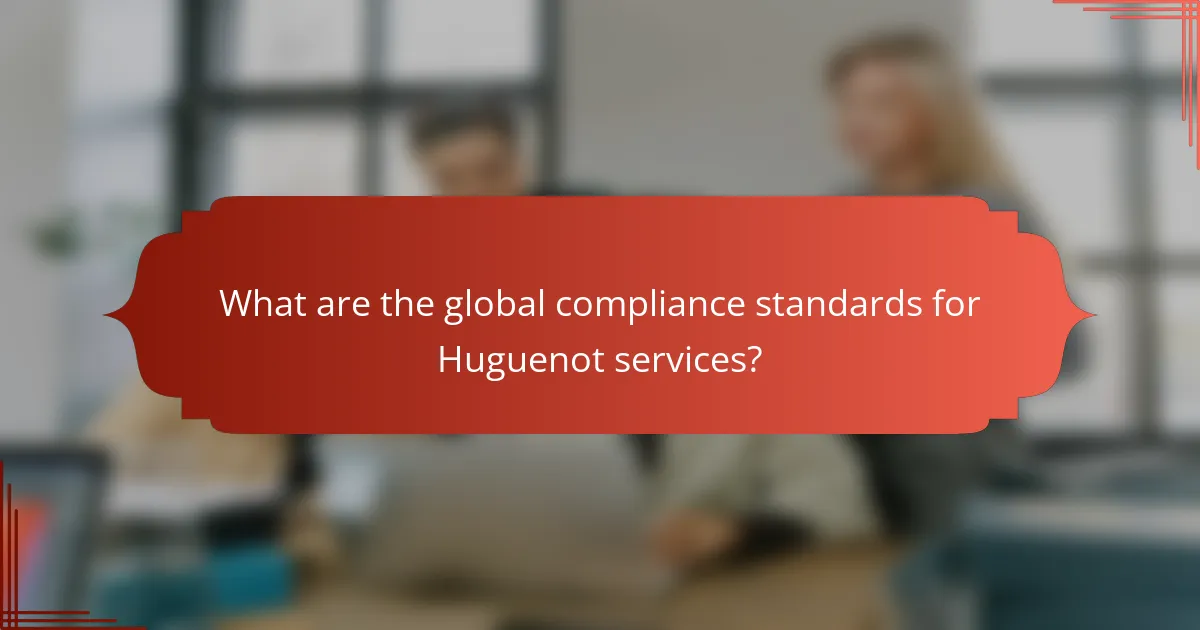
What are the global compliance standards for Huguenot services?
Global compliance standards for Huguenot services ensure that organizations meet specific quality, security, and regulatory requirements. These standards help maintain consistency and trust across various regions and industries, facilitating smoother operations and better service delivery.
ISO 9001 certification
ISO 9001 certification focuses on quality management systems and is essential for Huguenot services aiming to enhance customer satisfaction and operational efficiency. Organizations must demonstrate their ability to consistently provide products and services that meet customer and regulatory requirements.
To achieve ISO 9001 certification, companies should implement a quality management system that includes processes for continuous improvement, customer feedback, and employee training. Regular audits and reviews are also necessary to maintain compliance.
GDPR compliance
GDPR compliance is crucial for Huguenot services operating within or dealing with clients in the European Union. This regulation mandates strict guidelines on data protection and privacy, ensuring that personal data is processed lawfully and transparently.
Organizations must establish clear data handling policies, obtain explicit consent from individuals, and ensure that data is stored securely. Regular training for employees on data protection principles is also recommended to avoid potential fines and reputational damage.
ISO 27001 for information security
ISO 27001 is a key standard for information security management, applicable to Huguenot services that handle sensitive information. This certification helps organizations protect their data from breaches and cyber threats through a systematic approach to managing sensitive information.
To comply with ISO 27001, organizations should conduct risk assessments, implement security controls, and establish an information security management system (ISMS). Regular audits and updates to security measures are essential to adapt to evolving threats.
Industry-specific regulations
Huguenot services must also adhere to industry-specific regulations that vary by sector and region. These regulations can include financial compliance, healthcare standards, or telecommunications laws, each with unique requirements for service delivery.
Organizations should conduct thorough research to identify relevant regulations in their industry and region. Developing a compliance strategy that includes regular training, audits, and updates can help mitigate risks and ensure adherence to these standards.

How do Huguenot services vary across regions?
Huguenot services differ significantly across regions due to varying compliance standards, regulatory frameworks, and cultural practices. Understanding these variations is crucial for organizations seeking to implement Huguenot services effectively in different locales.
Variations in European compliance
In Europe, compliance with Huguenot services is influenced by the European Union’s regulations and individual country laws. Countries like France and Germany have specific guidelines that govern the operation of these services, focusing on data protection and consumer rights.
For instance, the General Data Protection Regulation (GDPR) impacts how Huguenot services handle personal data, requiring strict consent protocols. Organizations must ensure they are compliant with both EU-wide regulations and local laws to avoid penalties.
Differences in North American standards
North American compliance standards for Huguenot services are shaped by a mix of federal and state regulations. In the United States, there is no single comprehensive data protection law, leading to a patchwork of state-level regulations, such as the California Consumer Privacy Act (CCPA).
Organizations must navigate these varying standards, which can differ significantly from one state to another. It is essential to stay informed about local laws to ensure compliance and avoid legal repercussions.
Asia-Pacific regulatory frameworks
The Asia-Pacific region presents a diverse landscape of regulatory frameworks for Huguenot services, with countries like Australia and Japan having established specific compliance requirements. Australia’s Privacy Act mandates strict data handling practices, while Japan has its own set of privacy laws that organizations must follow.
Companies operating in this region should be aware of the differences in regulations and cultural expectations regarding privacy and data protection. Engaging local legal expertise can help navigate these complexities effectively.
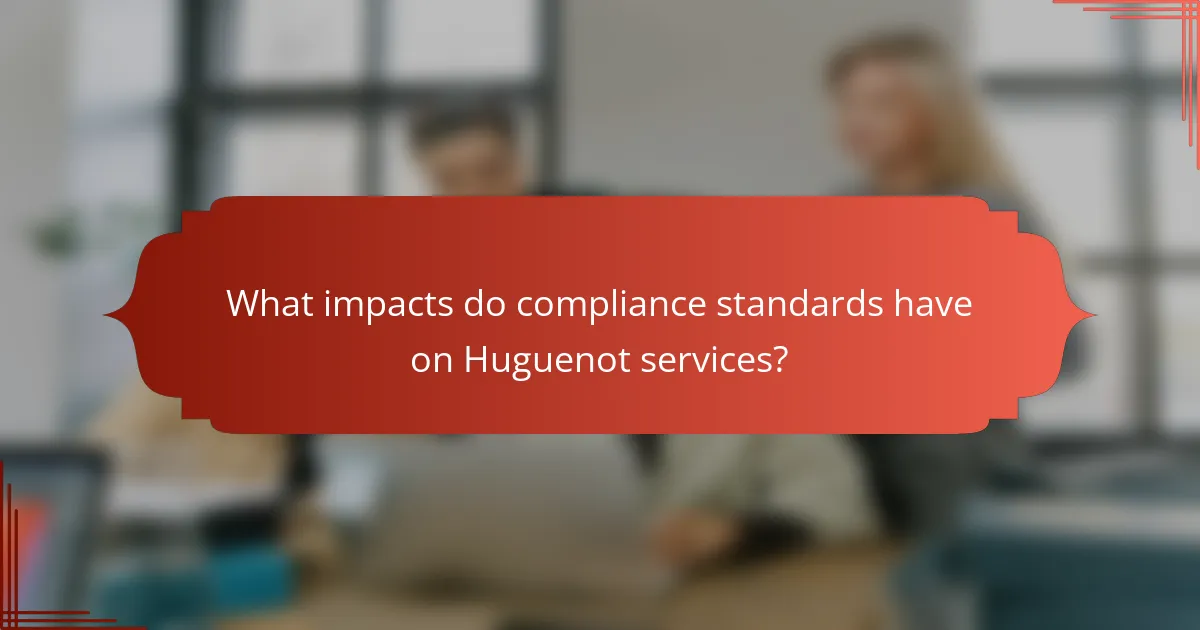
What impacts do compliance standards have on Huguenot services?
Compliance standards significantly affect Huguenot services by ensuring operational consistency, enhancing risk management, and improving market competitiveness. Adhering to these standards helps organizations streamline processes, mitigate potential risks, and access broader markets.
Operational efficiency improvements
Compliance standards drive operational efficiency by establishing clear protocols and guidelines. This clarity allows Huguenot services to minimize errors and reduce redundancies, leading to faster service delivery and lower operational costs.
For example, implementing standardized procedures can cut processing times by a significant margin, often reducing them from several days to just hours. Organizations that prioritize compliance often see a boost in productivity, allowing them to allocate resources more effectively.
Risk management enhancements
Adhering to compliance standards enhances risk management by identifying potential vulnerabilities and establishing mitigation strategies. Huguenot services that follow these standards can better anticipate regulatory changes and adapt accordingly, reducing the likelihood of non-compliance penalties.
Additionally, a robust compliance framework can lead to improved data security and privacy practices, which are crucial in today’s digital landscape. Organizations should regularly review their compliance policies to ensure they align with current regulations and best practices.
Market access and competitiveness
Compliance with recognized standards opens doors to new markets and enhances competitiveness. Huguenot services that meet international compliance requirements can attract clients from diverse regions, including Europe and North America, where adherence to such standards is often a prerequisite for doing business.
Moreover, being compliant can serve as a unique selling proposition, differentiating Huguenot services from competitors. Companies should actively promote their compliance achievements to build trust with potential clients and partners.
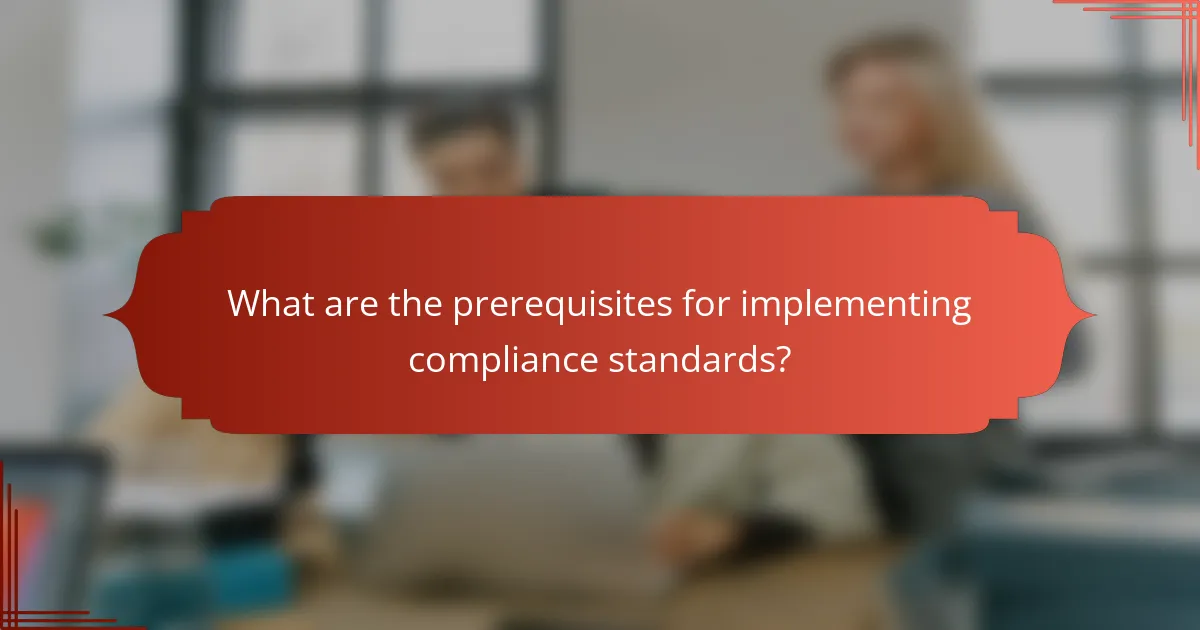
What are the prerequisites for implementing compliance standards?
Implementing compliance standards requires a clear understanding of existing practices, stakeholder involvement, and a commitment to continuous improvement. Organizations must assess their current operations and engage relevant parties to ensure effective integration of these standards.
Assessment of current practices
Assessing current practices involves a thorough review of existing processes, policies, and compliance measures. Organizations should identify gaps between current operations and the desired compliance standards. This may include evaluating documentation, workflows, and employee training programs.
To conduct an effective assessment, consider utilizing tools such as compliance checklists or audits. These can help pinpoint areas needing improvement and establish a baseline for future compliance efforts. Regular assessments can also foster a culture of accountability and transparency within the organization.
Stakeholder engagement requirements
Engaging stakeholders is crucial for the successful implementation of compliance standards. This includes identifying key individuals or groups affected by compliance measures, such as employees, management, and external partners. Effective communication and collaboration with these stakeholders can facilitate smoother transitions and greater buy-in.
To ensure comprehensive engagement, organizations should hold regular meetings, provide training sessions, and solicit feedback. This approach not only enhances understanding but also encourages a sense of ownership among stakeholders, leading to more effective compliance practices. Consider creating a stakeholder map to visualize relationships and responsibilities within the compliance framework.

How to choose the right compliance framework for Huguenot services?
Selecting the appropriate compliance framework for Huguenot services involves assessing your specific business requirements, comparing available frameworks, and seeking expert advice. A well-chosen framework ensures adherence to relevant regulations while supporting operational efficiency.
Evaluating business needs
Understanding your business needs is the first step in selecting a compliance framework. Consider factors such as the size of your organization, the nature of your services, and the specific regulatory environments you operate within. For instance, a small Huguenot service provider may prioritize cost-effective solutions, while a larger entity might require more comprehensive compliance measures.
Identify key areas where compliance is critical, such as data protection, financial reporting, or service delivery standards. This will help narrow down the frameworks that best align with your operational goals and risk management strategies.
Comparing frameworks
When comparing compliance frameworks, focus on their applicability to Huguenot services and the specific regulations they address. Common frameworks include ISO standards, GDPR for data protection, and local regulations that may vary by country. Each framework has its strengths and weaknesses, so evaluate them based on factors like ease of implementation, cost, and ongoing maintenance requirements.
Consider creating a comparison table that outlines the key features, benefits, and limitations of each framework. This visual aid can help clarify your options and facilitate informed decision-making.
Consulting with compliance experts
Engaging with compliance experts can provide valuable insights tailored to your Huguenot services. These professionals can help identify the most suitable frameworks based on your unique business context and regulatory landscape. They can also assist in interpreting complex regulations and ensuring that your compliance efforts are effective.
When consulting with experts, prepare specific questions regarding your compliance challenges and objectives. This will enable them to offer targeted advice and help you avoid common pitfalls associated with compliance implementation.
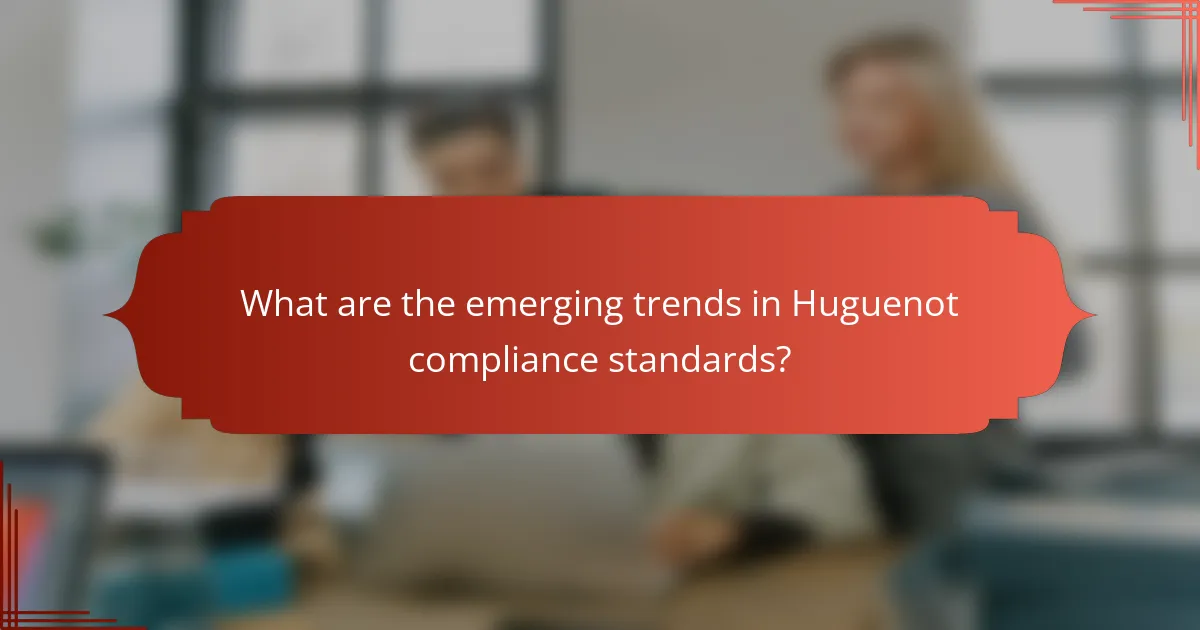
What are the emerging trends in Huguenot compliance standards?
Emerging trends in Huguenot compliance standards focus on enhancing transparency, accountability, and adaptability to global regulations. Organizations are increasingly adopting technology-driven solutions to streamline compliance processes and ensure adherence to evolving standards.
Increased Focus on Technology Integration
Organizations are leveraging technology to improve compliance efficiency. Automation tools and compliance management software help track regulatory changes and manage documentation effectively. This trend allows businesses to reduce human error and enhance data accuracy.
For example, firms are using cloud-based solutions to centralize compliance data, making it accessible and easier to update. This shift not only saves time but also facilitates real-time reporting, which is crucial for maintaining compliance with Huguenot standards.
Greater Emphasis on Training and Awareness
Training employees on compliance standards is becoming increasingly vital. Organizations are investing in regular training sessions to ensure that staff are aware of their responsibilities and the latest compliance requirements. This proactive approach helps mitigate risks associated with non-compliance.
In practice, companies might implement quarterly workshops or e-learning modules that cover key compliance topics. This strategy not only reinforces knowledge but also fosters a culture of compliance within the organization.
Shift Towards Global Standardization
There is a noticeable trend towards harmonizing compliance standards across borders. As businesses operate in multiple regions, aligning Huguenot compliance with international standards becomes essential. This alignment simplifies processes and reduces the complexity of managing diverse regulations.
For instance, organizations might adopt frameworks like ISO standards to ensure consistency in compliance practices globally. This approach not only enhances operational efficiency but also builds trust with stakeholders across different markets.
